Despite offering servicing rates that are actually cheaper than their rivals, franchised dealers are still perceived by customers as poorer ‘value for money’ than independent dealers or national chains, two polls have found.
The surveys, from the NFDA and What Car? show that the franchised sector has a long way to go to address what the industry believes are outdated and inaccurate views held by consumers.
The NFDA’s Autumn 2017 Consumer Attitude Survey, conducted with 1,000 motorists by market research agency Public Knowledge, found that the average price paid for a service at a franchised dealer was £146, compared with £147 at an independent dealer and £151 at a national chain.
However, while 71% of respondents felt that represented good value for money (a 2% rise on the spring survey), 83% of those who attended the independent dealer and the same proportion who went to the national chains said they had got value for money.
The NFDA’s survey found that the three factors most likely to convince consumers to use a franchised dealer for their servicing and maintenance needs related to value – 34% stipulated fixed-price servicing, the same proportion said competitive pricing for small repairs and 28% said discounted service plans were key.
A courtesy car was the fourth most popular response, highlighted by 27% of respondents.
Hidden value?
While What Car? did not compare price in its recent Servicing Satisfaction Survey, it did assess respondents’ perception of value for money, assigning a customer satisfaction percentage score that did echo the results of the NFDA poll.
 According to feedback from 8,300 motorists, independent workshops were better than their franchised counterparts when it came to value for money across servicing work, with an average customer satisfaction score of 89.8%, compared with 79.4% for franchised operators.
According to feedback from 8,300 motorists, independent workshops were better than their franchised counterparts when it came to value for money across servicing work, with an average customer satisfaction score of 89.8%, compared with 79.4% for franchised operators.
Independents also beat franchises on customer experience, scoring 94.2% on average for attitude and politeness of staff, compared with 91.1% for franchised dealers.
Franchised workshops also scored less for the quality of work, with 88.5% of customers satisfied, compared with 92.7% of those who used independent workshops.
The overall satisfaction rating for independents, according to the What Car? survey, was 92.2%, nearly six percentage points higher than the score for franchised dealers. The survey stated that this was “mainly because car owners believe they get better value for money”.
Mark Squires, the chairman of the NFDA, said: “There is still a gap between perception and reality on pricing for servicing.
“I think, ultimately, much depends on consumers’ perception of value. If it’s top-quality service from technicians specifically trained and equipped to work on your car, then the franchised sector is clearly succeeding.”
However, Squires added: “Part of the problem is that when you put a franchised dealer and an independent side by side, you are comparing apples with oranges, but in consumer’s minds they do think they’re comparable.”
In its survey, the NFDA reported that the overall satisfaction with franchised dealerships’ customer service “remains high”, with 79% of customers saying they were satisfied with their most recent experience (unchanged from the previous survey).
Independents scored 86% (down 1ppt) and national chains 70% (down 2ppts).
Smaller share, slimmer margins
A Trend Tracker analysis of the market in 2015 identified an erosion of the franchised dealer’s aftersales heartland amounting to 20% in the preceding decade.
![]() Director Chris Oakham said that the zero-to four-year-old car parc had declined from 10 million in 2003 to eight million by 2014, prompting a decline in franchised workshops’ market share from 46% in 2007 to 40% by 2012. The independents’ share rose from 45% to 50% over the same period.
Director Chris Oakham said that the zero-to four-year-old car parc had declined from 10 million in 2003 to eight million by 2014, prompting a decline in franchised workshops’ market share from 46% in 2007 to 40% by 2012. The independents’ share rose from 45% to 50% over the same period.
As new car sales recovered from 2012, the newer vehicle car parc recovered and franchised dealers’ share rose to 42% with the independent sector at 48%, but Oakham warned that the increased reliability of cars, a reduction of annual mileages from 8,000 to 10,000 and longer service intervals could mean “franchised workshops will see their share fall below 40% by 2021”.
It found more than half of people with cars still under manufacturer warranty turned to a main dealer for servicing, and within those, 68.5% did so because they still have a misconception that it is a condition of the warranty agreement.
Once the manufacturer warranty period is over, many defect to independents or national chains.
According to the NFDA’s survey, franchised dealers have worked hard to retain customers and appeal to a new audience by competing on price, despite the cost of investment in manufacturers’ corporate identity upgrades, technician training and workshop equipment.
![]() In August, UK franchised dealerships slipped to the worst profitability levels for the month in five years. According to ASE, the average dealer lost almost £17,000 (some £2,000 worse than August 2016’s result) taking the rolling 12-month profit to £182,000.
In August, UK franchised dealerships slipped to the worst profitability levels for the month in five years. According to ASE, the average dealer lost almost £17,000 (some £2,000 worse than August 2016’s result) taking the rolling 12-month profit to £182,000.
The result saw the average dealer’s return-on-sales percentage drop below 1% for the first time since August 2012.
This came despite service gross profit on labour standing 0.1ppt above its benchmark, due, in no small part, to the figure for service expenses as a percentage of gross standing at 60.9% for the month, compared with a 40% benchmark.
Trusted, professional
Consumers’ perception of franchised dealers as more professional and knowledgeable than their rivals may be the best foundation to base the marketing of their servicing offers, believes Squires.
Of respondents to the Autumn 2017 NFDA Consumer Attitude Survey, 67% believed a franchised dealership was the safest place to service their car.
One question asked respondents to identify the words they most closely associated with franchised, independent or national chain businesses.
The franchised segment topped the scores for ‘professional’ (59%), ‘knowledgeable’ (49%), ‘reputable’ (45%), ‘reliable’ (42%), ‘trustworthy’ (36%), ‘efficient’ (35%) and ‘helpful’ (35%).
Independent traders came first for ‘friendly’ (44%), ‘local’ (58%), ‘convenient’ (43%) and ‘good value for money’ (39%).
Among EV and hybrid vehicle owners, the strength of those attributes is most marked. Some 54% of hybrid owners and 56% of EV owners said they would trust a franchised dealer most to service their car.
Of NFDA survey respondents who were franchised customers, 57% said they chose their provider because they were ‘specialists in my kind of car’, 46% because ‘I trust them’ and 45% because of the ‘level/quality of service’.
ASE chairman Mike Jones said franchised dealers need to make more of their reputation as the industry’s technical experts, stating: “Retailers need to stress the investment they have made”.
He added: “As vehicles become increasingly complex, it becomes more difficult for some independents to compete.”
Steve Huntingford, the editor of What Car?, suggested a manufacturer’s service book stamp still held appeal: “The protection of the manufacturer warranty, original parts and other franchise benefits such as a full valet and visual health check, still hold currency throughout the customer lifecycle where they are offered.”
He believes loyalty is the key driver of success, a point emphasised by the NFDA’s findings that positive perception of franchised dealers grows with familiarity.
He said: “With value as a main driver for wandering customers, franchised dealers should look to secure loyalty early on.”
Nathan Tomlinson, dealer principal at Devonshire Motors, believes loyalty removes the need to break a deadlock that can only otherwise be broken by competing with independents on price.
“The problem we face is still perception,” he said.
“If you have a close relationship with your customers, then trust and communication go a long way to preventing many of the pitfalls which cause us to use price as a tool to win lapsed customers back.
“Consumers would much prefer to use franchised repairers, but in many cases are let down by the experience as we fail to listen and act to meet their individual needs.”

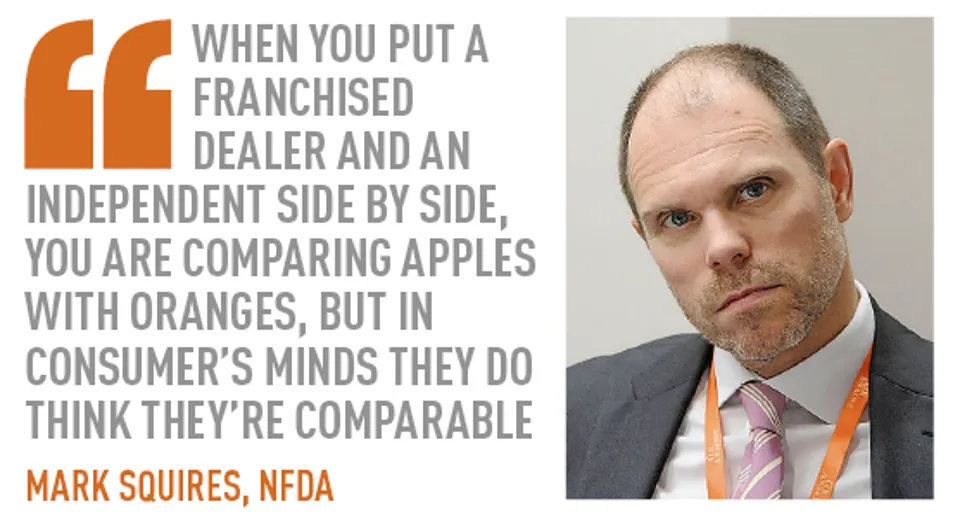


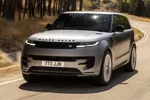

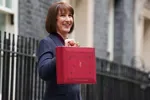
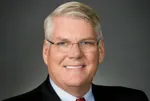



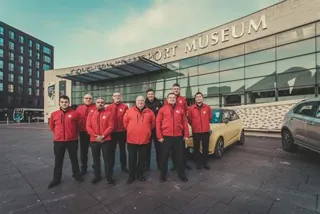
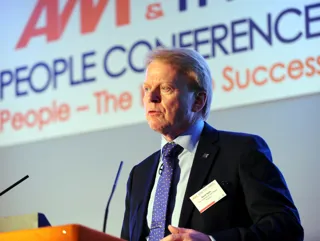
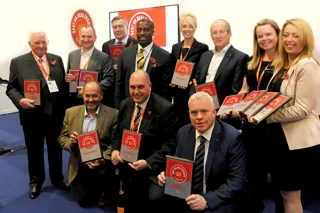



Login to comment
Comments
No comments have been made yet.